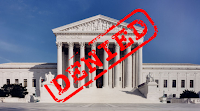The Supreme Court has refused to review a Sixth Circuit decision, affirming a district court, which dismissed claims filed by two limited liability companies (LLCs) that IRS violated the Right to Financial Privacy Act by issuing John Doe summonses for their financial information without prior court approval.
IRS issued two "John Doe" summonses without first obtaining approval in a federal district court as required by Code Sec. 7609(f). IRS served the summonses on Chase Bank to obtain financial records relating to two single-member LLCs.
The issues are (1) whether the U.S. government waived its sovereign immunity to allow LLCs to sue under the Right to Financial Privacy Act; and (2) whether the LLCs have any remedy under the Code for IRS's violation of Code Sec. 7609(f).
The Sixth Circuit dismissed the LLCs' claims that IRS violated the Right to Financial Privacy Act by issuing the John Doe summonses. The Court reasoned that such claims by LLCs, unlike such claims by certain partnerships, were barred by sovereign immunity. The Court also found that the taxpayer had no remedy under the Code with respect to IRS's failure to obtain prior court approval. (Hohman et al v. Eadie et al, (CA 6 7/5/2018) 122 AFTR 2d 2018-5053, see LLC isn't treated like a partnership under federal privacy law)
The Sixth Circuit agreed with the district court that the US government did not waive sovereign immunity. It said that the question of whether an LLC has standing under the Act was an issue of first impression in the circuit courts and had only been addressed by two district courts, both of which ruled against the LLCs.
The Sixth Circuit said that, admittedly, a single-member LLC resembled individuals or partnerships covered under the Act. However, "it is never the Court's job to rewrite a constitutionally valid statutory text under the banner of speculation about what Congress might have done had it faced a question that... it never faced." Here, the Court said, an LLC was plainly not within the plain meaning of the words "individual or a partnership of less than five individuals." "While it is true that single-member LLCs, are disregarded by the government for federal income tax purposes, that fact does not overcome the limited liability aspect and strict textual approach that this court must apply when interpreting waivers of sovereign immunity."
The Court also concluded that there was no remedy under the Code for IRS's violation of Code Sec. 7609(f). It said that the Code provision that came the closest to providing a remedy for the taxpayers in this case was Code Sec. 7433. However, Code Sec. 7433 only authorizes damages for claims in connection with any collection of federal tax and does not allow for damages for violations made during the assessment or tax determination part of the process.
No further review. On Feb. 19, 2019, the Supreme Court refused to review the Sixth Circuit's decision. Accordingly, that decision is now final.
Contact the Tax Lawyers at
Marini & Associates, P.A.
for a FREE Tax Consultation Contact US at
or Toll Free at 888-8TaxAid (888 882-9243).
Read more at: Tax Times blog





